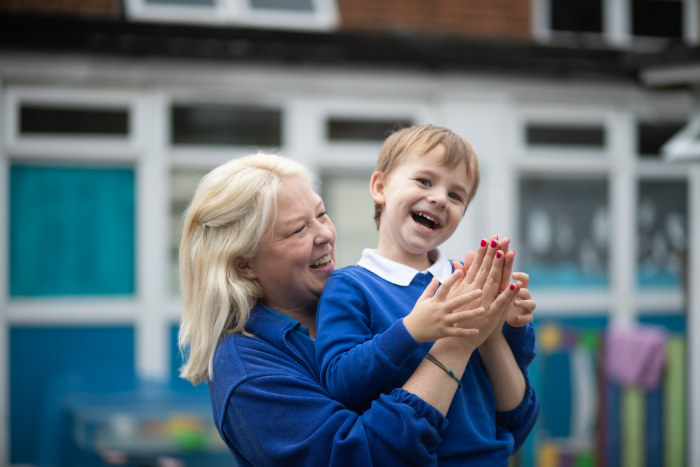
Autism and Home-schooling – A Candid Discussion with Parents about Learning in Lockdown
Lizzie is 11 years old and she was diagnosed in August 2020. We asked Debbie about the difficulties and benefits she and Lizzie experienced, and her final decision to continue home-schooling when lockdown ends…
Interviewer:
Can you tell me a little bit about some of the difficulties Lizzie’s had during lockdown and some of the pressures you’ve had as a family, in particular relating to the home-schooling aspect?
Debbie:
So, initially, at the beginning of the first lockdown in March 2020, Lizzie found it really hard to access anything online? So, anything Zoom-group-wise was very challenging, and she would refuse to do it, so…
…she wouldn’t engage with anything online unless the camera was off, she was on mute, and then she’d just get distracted.
So not a lot of learning happened at all. As a family, obviously, we’ve had to juggle working, working from home, other siblings. Not easy, but not impossible, but Lizzie’s found the pressures of life being taken away much easier. So, she’s gained an awful lot of benefit from not having to do what she would normally have to do.
Interviewer:
Have you managed to get into any kind of routine with home-schooling?
Debbie:
Yes, we have. Yeah. We really have. Over the year, we’ve sorted out other alternatives for her.
So, we’ve managed to set up some set one-to-one sessions with different people. So that’s how we’ve discovered that’s how she likes to learn best, one-to-one so it’s completely engaged at her.
She hasn’t got to worry about the pressures of anybody else and speaking in front of other people. So, we’ve arranged one-to-one sessions via Zoom, but she can engage with them fully and get the best she can from them. So, we’ve managed to slot those in at set times each week, which again has really helped her.
Interviewer:
Are you building your own curriculum to suit Lizzie?
Debbie:
No. We are doing everything completely led by her. So, she chooses what we do, when we do it and how we do it, apart from the set sessions, but they’re very much led by the tutor to say, “Well, what would you like to do?”
And having that choice has helped her feel in control.
Interviewer:
Perfect. Do you think that Lizzie’s learning new skills during lockdown?
Debbie:
Yes, absolutely. She’s learned many things that she wouldn’t have had the opportunity to. Because again, she’s not having to engage with real life and being out with people and being stressed by school…
…she’s felt more comfortable in herself and more confident.
So, whereas before she was scared of boiling the kettle, because obviously it was hot and it might hurt her, she’s now learned making tea. So now she’s happily making tea for everybody, which is something she would never have done before. And she’s also learning a little bit about what she likes about learning and what she doesn’t like.
She’s able to recognise why she didn’t like learning at school as much as she does now.
Interviewer:
So how are you juggling home-schooling and work? And I guess the question is really…
… are there any concessions that you’ve made or adaptations that you’ve found that have really worked?
Debbie:
I think it’s not sticking to a timetable. Having the fact that learning doesn’t happen between nine and three, Monday to Friday.
We can learn at any time.
So, Lizzie doesn’t sleep early, so we’ve found her picking up a word-search or picking up some maths work at 10 o’clock at night. That’s fine. It doesn’t have to be in a set routine, so to speak. So, we’ve found that has been really, really useful, to just go,
“Well, we don’t have to do it on a set day, so therefore we can learn whenever she’s ready and whenever we’re ready.”
…
Interviewer:
If you had… top tips for supporting your child with their home-schooling, what would they be?
Debbie:
That’s a bit of a tricky one. What my top tips would be… It would be to do what they love. Follow what they want to do rather than worrying about sticking to the National Curriculum, because we’ve obviously stuck to the National Curriculum for the last however many years. It hasn’t done her any favours.
Now we’ve taken that pressure off and gone, “What do you want to do?” we are seeing more successes.
“We don’t have to read, if you don’t want to read. We only have to read the books you want to read, and we only have to watch the things you want to watch.” So, her being in control has helped.
Interviewer:
What are the… most challenging [things], and how have you managed with those?
Debbie:
Oh, most challenging. I would say feeling like you’re doing the best by your child, because…
…not having the support of school is daunting and you feel suddenly responsible for not just the welfare, but also the education.
Interviewer:
How have you supported your own wellbeing, as well as Lizzie’s?
Debbie:
Finding people that understand, so making sure the family are on board with what we’re doing and how we’re home-schooling, which is one of the biggest challenges, but having their support helps.
And for me, it’s taking the dogs for a walk, getting out of the house and just having 10 minutes by myself. Obviously, having children at home all the time, you don’t get that peace and quiet of nine till three.
Interviewer:
Can you share any positives you’ve experienced from home-schooling?
Debbie:
I think our family are much happier. We’re not stuck to a routine.
We feel more relaxed, we feel more free, and our children are happier.
Interviewer:
What are your general observations on how Lizzie has adapted to home-schooling?
Debbie:
… She’s adapted her confidence. And her self-esteem means that she has recognized, “I can do these things. I’m not struggling any more. I can do things because I’m doing everything at my own pace.”
Interviewer:
How are you feeling about the prospect of Lizzie actually returning to school?
Debbie:
Well, we decided to home-school her long-term, so we won’t be sending her back to school, because we’ve seen so many positives and so many benefits of her being home.
Interviewer:
Wow. Brilliant. Okay. That is really, really good stuff.
Debbie left us with some really interesting final comments.
Debbie:
… I think for most people, everyone goes, “The education’s most important,” but for me, if my child’s not happy and they don’t know how to regulate their emotions and they’re struggling through life all the time, they’re not going to learn anyway. So I think it’s breaking away from that norm, isn’t it?
Are you interested in continuing home-education after lockdown? Check out Home Education: Guidance and Resources for Parents.
These two resources offer parents advice and support for home educating. The first, Elective Home Education in England: Know Your Rights, discusses the considerations and implications of choosing to home educate. The second, Top Tips, Strategies and Resources for Parents, offers guidance to parents who have made the decision to home educate their child(ren) or find themselves teaching at home during the pandemic. It includes practical tools and top tips.
Check out our YouTube Channel for more parent interviews!



